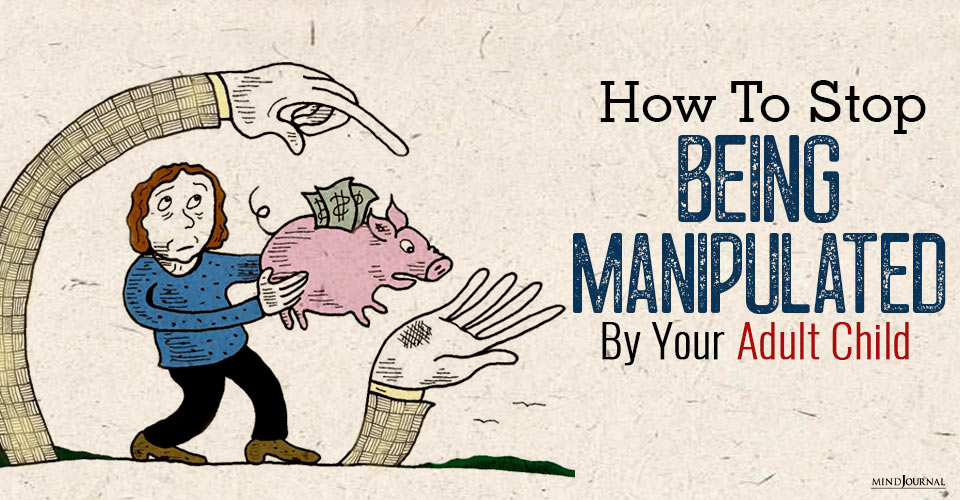Are you being manipulated by your adult child? Even if they’re selfish and wear you down, find innovative ways to stop your child’s manipulative behavior.
Let’s take a look at why and how manipulative children behavior takes place.
As a parent coach, I often hear concerns similar to what Joan recently said to me: “My adult daughter Briana knows exactly what to say to make me feel guilty and then I give in to her unreasonable demands. I try to be kind and generous but she makes me feel like I am the worst, most unsupportive parent in the world!”
Before I go further, let me say this: I realize that there are many toxic parents of adult children out there. If you are an adult child of truly toxic parents who traumatized you, I empathize. I also work with many adult children who have been mistreated and abused by their parents. And as a parent myself, I’ve made my own share of mistakes and could have done some things better. At the same time, there are countless parents who try their best while falling far short of being perfect.
So, if you happen to be a frustrated adult child, know and reclaim your value. Don’t compromise your worth by riding on a horse named Victim and repeatedly heading to the same rodeo. Don’t blame your parents for your own struggles without also taking a look in the mirror. Ask yourself how you can move toward your own valuable independence.
Related: Psychopathy in Children: How To Spot and Deal With Psychopathic Children
Bottom line: Learn to feel good about knowing your own value as an adult even if your parent(s) did not do the best job of seeing it or expressing it.

Returning now to the opening of this post: Joan’s description of her adult daughter, Briana, (names changed for privacy) is heart-wrenching. She feels vulnerable to her adult daughter’s manipulations. Many of my clients share similar stories with me. They feel sucked into the vortex of guilt-inducing messages such as:
- If you really loved me, you wouldn’t question why I need this!
- You make me feel like the black sheep of this family!
- You’re selfish and never think about anyone but yourself!
- You invalidate me all the time!
- I thought I could count on you but obviously I can’t!
- Fine, I’ll just end up homeless!
As a parent, maybe you can identify with being on the receiving end of toxic, manipulative messages like these. And if you can, you may ask, “So, now what do I do?” I can tell you that Joan learned to respond to these types of manipulations from Briana in a much more emotionally healthier way.
Read Why Kids Hate Eating Vegetables? 9 Reasons and Tips To Fix That
Now, what about you?
If you are sick and tired of the manipulation, here’s a helpful word to empower you: Enough! As in, Enough is enough!

When your adult child tries to engage you through shame with pressuring demands, when your adult child is emotionally abusive, or when your adult child fails to acknowledge your love and/or the positive things you have done, you have to draw the line and say, or at the very least, think, Enough:
- Enough of being a punching bag for misplaced and displaced disappointments and frustrations.
- Enough of beating yourself up for past mistakes you’ve made as a parent.
- Enough of being what I call a SWAT team parent. Stop setting yourself up to be on call to automatically respond to and solve the next manufactured, drama-laden crisis.
- Enough negatively comparing yourself to parents of adult children who do not have the same struggles as your own.
Read Raising Well-Behaved Kids: Mistaken vs. Smart Discipline
The next time your adult child tries to be manipulative or is hurtful toward you, step back and do the following:
How To Stop Being Manipulated by Your Adult Child
1. Whether communicating in person, on the phone, or through text messages, within your mind, rise up and watch the toxic manipulations from above.
2. Understand these manipulations for what they are and thank yourself for seeing them instead of getting sucked in and being a victim to them.
3. Now, think “Enough!” and, if you feel it’s appropriate, then also say, “Enough.”
4. Realize that now knowing when enough is enough empowers you to set those crucial boundaries with your adult child and no longer be a victim of manipulations.
If you’re being manipulated by your child, learn more about manipulative behaviors in your child in the video below:
Are you ready to stop being manipulated by your adult child?
Share this article on how parents are manipulated by their own children with anyone who you may think will find it valuable and helpful.
Written by:Jeffrey Bernstein, Ph.D. Originally appeared on: Psychology Today Republished with permission












Leave a Reply